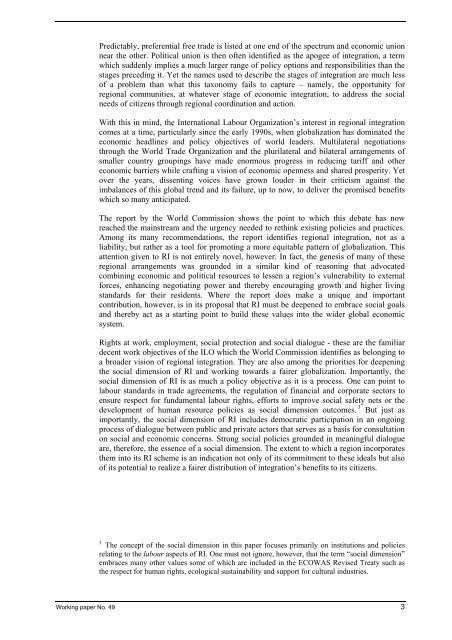The Social Dimension of Regional Integration in ECOWAS
The Social Dimension of Regional Integration in ECOWAS
The Social Dimension of Regional Integration in ECOWAS
Create successful ePaper yourself
Turn your PDF publications into a flip-book with our unique Google optimized e-Paper software.
Predictably, preferential free trade is listed at one end <strong>of</strong> the spectrum and economic union<br />
near the other. Political union is then <strong>of</strong>ten identified as the apogee <strong>of</strong> <strong>in</strong>tegration, a term<br />
which suddenly implies a much larger range <strong>of</strong> policy options and responsibilities than the<br />
stages preced<strong>in</strong>g it. Yet the names used to describe the stages <strong>of</strong> <strong>in</strong>tegration are much less<br />
<strong>of</strong> a problem than what this taxonomy fails to capture – namely, the opportunity for<br />
regional communities, at whatever stage <strong>of</strong> economic <strong>in</strong>tegration, to address the social<br />
needs <strong>of</strong> citizens through regional coord<strong>in</strong>ation and action.<br />
With this <strong>in</strong> m<strong>in</strong>d, the International Labour Organization’s <strong>in</strong>terest <strong>in</strong> regional <strong>in</strong>tegration<br />
comes at a time, particularly s<strong>in</strong>ce the early 1990s, when globalization has dom<strong>in</strong>ated the<br />
economic headl<strong>in</strong>es and policy objectives <strong>of</strong> world leaders. Multilateral negotiations<br />
through the World Trade Organization and the plurilateral and bilateral arrangements <strong>of</strong><br />
smaller country group<strong>in</strong>gs have made enormous progress <strong>in</strong> reduc<strong>in</strong>g tariff and other<br />
economic barriers while craft<strong>in</strong>g a vision <strong>of</strong> economic openness and shared prosperity. Yet<br />
over the years, dissent<strong>in</strong>g voices have grown louder <strong>in</strong> their criticism aga<strong>in</strong>st the<br />
imbalances <strong>of</strong> this global trend and its failure, up to now, to deliver the promised benefits<br />
which so many anticipated.<br />
<strong>The</strong> report by the World Commission shows the po<strong>in</strong>t to which this debate has now<br />
reached the ma<strong>in</strong>stream and the urgency needed to reth<strong>in</strong>k exist<strong>in</strong>g policies and practices.<br />
Among its many recommendations, the report identifies regional <strong>in</strong>tegration, not as a<br />
liability, but rather as a tool for promot<strong>in</strong>g a more equitable pattern <strong>of</strong> globalization. This<br />
attention given to RI is not entirely novel, however. In fact, the genesis <strong>of</strong> many <strong>of</strong> these<br />
regional arrangements was grounded <strong>in</strong> a similar k<strong>in</strong>d <strong>of</strong> reason<strong>in</strong>g that advocated<br />
comb<strong>in</strong><strong>in</strong>g economic and political resources to lessen a region’s vulnerability to external<br />
forces, enhanc<strong>in</strong>g negotiat<strong>in</strong>g power and thereby encourag<strong>in</strong>g growth and higher liv<strong>in</strong>g<br />
standards for their residents. Where the report does make a unique and important<br />
contribution, however, is <strong>in</strong> its proposal that RI must be deepened to embrace social goals<br />
and thereby act as a start<strong>in</strong>g po<strong>in</strong>t to build these values <strong>in</strong>to the wider global economic<br />
system.<br />
Rights at work, employment, social protection and social dialogue - these are the familiar<br />
decent work objectives <strong>of</strong> the ILO which the World Commission identifies as belong<strong>in</strong>g to<br />
a broader vision <strong>of</strong> regional <strong>in</strong>tegration. <strong>The</strong>y are also among the priorities for deepen<strong>in</strong>g<br />
the social dimension <strong>of</strong> RI and work<strong>in</strong>g towards a fairer globalization. Importantly, the<br />
social dimension <strong>of</strong> RI is as much a policy objective as it is a process. One can po<strong>in</strong>t to<br />
labour standards <strong>in</strong> trade agreements, the regulation <strong>of</strong> f<strong>in</strong>ancial and corporate sectors to<br />
ensure respect for fundamental labour rights, efforts to improve social safety nets or the<br />
development <strong>of</strong> human resource policies as social dimension outcomes. 3 But just as<br />
importantly, the social dimension <strong>of</strong> RI <strong>in</strong>cludes democratic participation <strong>in</strong> an ongo<strong>in</strong>g<br />
process <strong>of</strong> dialogue between public and private actors that serves as a basis for consultation<br />
on social and economic concerns. Strong social policies grounded <strong>in</strong> mean<strong>in</strong>gful dialogue<br />
are, therefore, the essence <strong>of</strong> a social dimension. <strong>The</strong> extent to which a region <strong>in</strong>corporates<br />
them <strong>in</strong>to its RI scheme is an <strong>in</strong>dication not only <strong>of</strong> its commitment to these ideals but also<br />
<strong>of</strong> its potential to realize a fairer distribution <strong>of</strong> <strong>in</strong>tegration’s benefits to its citizens.<br />
3 <strong>The</strong> concept <strong>of</strong> the social dimension <strong>in</strong> this paper focuses primarily on <strong>in</strong>stitutions and policies<br />
relat<strong>in</strong>g to the labour aspects <strong>of</strong> RI. One must not ignore, however, that the term “social dimension”<br />
embraces many other values some <strong>of</strong> which are <strong>in</strong>cluded <strong>in</strong> the <strong>ECOWAS</strong> Revised Treaty such as<br />
the respect for human rights, ecological susta<strong>in</strong>ability and support for cultural <strong>in</strong>dustries.<br />
Work<strong>in</strong>g paper No. 49 3

















